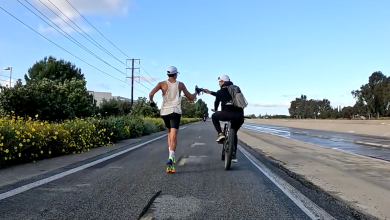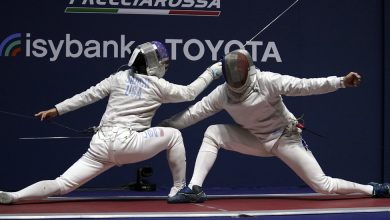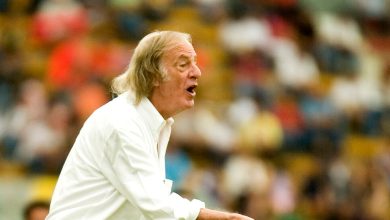Novak Djokovic Returns to the Australian Open, No Longer a Villain

MELBOURNE, Australia — It was the day before the Australian Open, and the Park Hotel in Melbourne’s Carlton neighborhood was closed with only the occasional pedestrian passing in front of the dusty, deserted entrance on a sedate Sunday.
Quite a different scene than last year, when Novak Djokovic, the world’s No. 1 tennis player, was in detention in Carlton ahead of the Open. He was about to be deported by the Australian government and miss the tournament after arriving in the country unvaccinated for the coronavirus and losing his final legal appeal.
“I just think the whole thing was totally embarrassing and it could have been avoided,” said Ailsa McDermid, a Melburnian who shuffled by on Sunday with a shopping bag in each hand and looked up at the now-vacant hotel.
Its large sign was covered by a dark tarpaulin, which seemed an appropriate metaphor: L’Affaire Djokovic was major news worldwide in January 2022, dominating conversation in the run-up to the year’s first Grand Slam event, which Djokovic has won nine times, a men’s tournament record.
But a year later, the city, country and sport seem eager to move on while getting back to tennis as usual.
The Australian Open “will mark a welcome return to normalcy after three years of bushfires, pandemic and the furor last year about Novak Djokovic’s vaccination status,” The Age, one of Melbourne’s leading newspapers, wrote in an editorial that was posted online Sunday with the headline “Let’s Enjoy Great Tennis, Pure and Simple.”
Djokovic, 35, remains one of the few leading professional tennis players to remain unvaccinated for the coronavirus, but Australia, which had some of the most stringent restrictions in the world during the pandemic, no longer requires proof of vaccination or a negative test for entry into the country except for travelers arriving from China.
Though Djokovic was automatically barred from Australia for three years after his deportation, the new Australian government chose to overturn that ban in November, and the Serb has returned to a welcome every bit as warm as Saturday’s sultry summer weather in Melbourne.
He was cheered in Adelaide as he won a lead-in tournament against a strong field, and he received more strong and vocal support Friday night as he played an intermittently intense and lighthearted practice match in Rod Laver Arena with the Australian Nick Kyrgios in front of a capacity crowd of 15,000 that had snapped up the available tickets in under an hour.
“I was very emotional, honestly, coming into the court with the reception that I received,” Djokovic said Saturday. “I didn’t know how that’s going to go after the events of last year. I’m very grateful for the kind of energy and reception, love and support I got.”
There is still ample resistance to Djokovic’s presence in Australia. In December, The Sydney Morning Herald commissioned a national poll in which 41 percent of the respondents said he should not be allowed to stay in the country and play in the Australian Open. Only 30 percent clearly supported his participation, and another 29 percent said they did not have a strong opinion on the matter.
But those mixed feelings have not been noticeable (or audible) during his matches so far, and he was relaxed enough Friday night to dance on changeovers and wiggle as he waited to return Kyrgios’s serve.
“If I do hold the grudge, probably if I’m not able to move on, I wouldn’t be here,” he said. “Also, I have to say that the amount of positive experiences I had in Australia overwhelm the negative experience maybe of last year. My impression of Australia, my vision of Australia, has always been very positive, and that has reflected on my performance.”
Djokovic won the first of his 21 Grand Slam titles at the Australian Open in 2008 — beating then-No. 1 Roger Federer in straight sets along the way — and has reserved some of his finest tennis for the hardcourts of Melbourne Park. He has a bright and shiny 82-8 singles record at the tournament and has never lost in the final. From the early years of his career, he has received particularly vocal support from Australia’s sizable Serbian population, and there were Serbian flags in abundance Friday night, just as there were last year in front of the Park Hotel as supporters protested his detention.
But the cheers this year have come from a much wider fan base.
“Australians have a bit of a tall poppy syndrome, so they like cutting people down when they get too big,” said Michaela Kennedy, 26, a Melbourne lawyer who attended Friday’s practice match. “But they also love a comeback story, and now Novak is a comeback story. So that’s how it works.”
The context has certainly changed in Melbourne. When Djokovic arrived in January 2022, the population was still reeling from the series of strict lockdowns and travel restrictions that had kept some family members separated. In an interview last week with Australia’s Channel Nine network, Djokovic said he understood the anger of Australians after he was initially cleared to enter the country.
“I understand that it was a frustrating period for a lot of people around the world, particularly here in Australia for two years,” he said. “So I understand that when media writes in a certain way about a guy who tried to go in without a vaccine that people would say: ‘Wait, wait a second. Why is he allowed to come in when many people aren’t able or allowed to come from wherever they are around the world to their own country? So I understand why they were frustrated, but again I have to say that the media presented in a completely wrong way.”
In Djokovic’s view, he was “just following the rules” and was in possession of the “valid papers,” including the exemption that had been validated by an independent body. (He did neglect to note upon arrival that he had traveled to Spain shortly before coming to Australia.)
There clearly was miscommunication, or perhaps rivalry, between the regional government of Victoria, which initially supported the visa, and the federal government, which canceled it. Djokovic surely would not have boarded the plane to Melbourne if he had not believed he had what he needed to enter. Ultimately, he was deported by Alex Hawke, then the immigration minister, not because of a visa irregularity but because it was deemed in the public interest to keep him from becoming a rallying point for the anti-vaccination movement in Australia.
Despite the debacle, there has been minimal fallout in Australian tennis. Craig Tiley, the Australian Open tournament director and chief executive of Tennis Australia, has remained in his post along with his core support team. He did not respond to requests for an interview and has not explained in detail how the mixed signals involving Djokovic came about, but he told The Australian newspaper last week that “he knew the truth” and took strength from it.
“Would I prefer it didn’t happen? Absolutely,” Tiley said. “Personally, it was a very difficult period, but I was more concerned about our team and staff who were impacted indirectly and in some cases directly impacted by some of the extreme negativity and blame game that went on. But at the end of the day we were just doing our best.”
What has changed is the Park Hotel, long used as a detention facility for asylum seekers, some of whom had been confined there for nine years in often spartan conditions, sparking protests from human rights groups in Australia. But Djokovic’s arrival intensified the spotlight, and in April, the facility’s last detainees were released on short-term visas.
“In that respect, Novak did refugees a favor,” Ian Rintoul, a Refugee Action Coalition spokesman, said in an interview with Code Sports.
Djokovic has expressed his delight for the refugees who have been released. “I stayed there for a week, and I can’t imagine how they felt for nine years,” he said in May.
The Park Hotel’s future remains unclear, but Djokovic has no doubt upgraded his accommodations in 2023, and though he has been playing with a nagging hamstring injury, he has been moving well enough to be rightfully considered a strong favorite to win again in Melbourne.
Doing so would allow him to tie Rafael Nadal, who won the title here last year, for the men’s record of 22 Grand Slam singles titles.
I asked Djokovic on Saturday if that was motivation.
“Of course it is,” he answered. “I like my chances. I always like my chances. I train as hard as really anybody out there. There’s a lot of youngsters now that are very hungry, that want to win.”
Djokovic added, “The experience of being in these kind of particular circumstances helps I think to have the right approach and do things in a proper way, because I know when I’m healthy and playing my best on this court I have chances really against anybody.”




